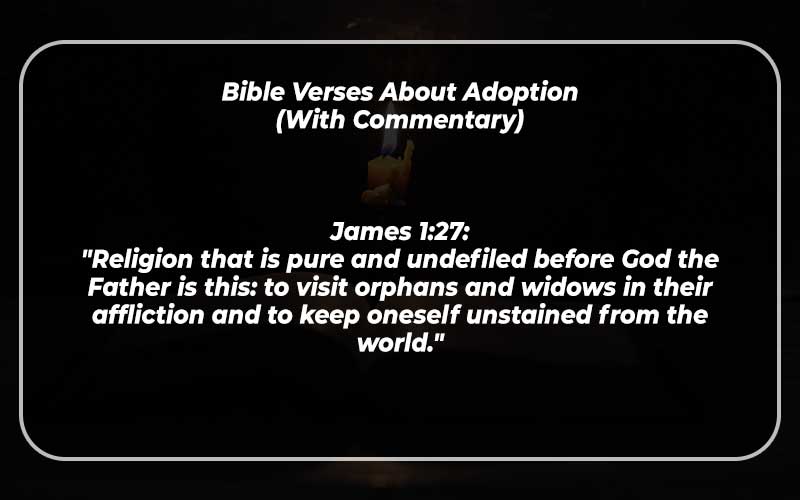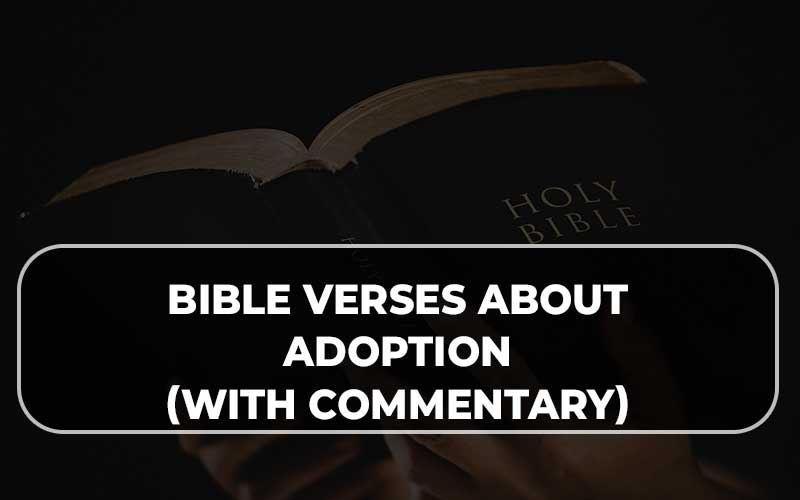Adoption is a profound concept that resonates not only in human relationships but also holds deep spiritual significance in the Bible. In the Scriptures, adoption symbolizes the believer’s inclusion into God’s family through faith in Jesus Christ.
This collection of 30 Bible verses about adoption, accompanied by commentary, explores the rich tapestry of God’s love and the transformative nature of being adopted into His family.
Bible Verses About Adoption
Romans 8:15 (NIV):
“The Spirit you received does not make you slaves, so that you live in fear again; rather, the Spirit you received brought about your adoption to sonship. And by him, we cry, ‘Abba, Father.'”
Paul emphasizes the believer’s new identity as adopted sons and daughters of God, marked by an intimate, familial relationship and a spirit of reverence.
Galatians 4:4-7 (NIV):
“But when the set time had fully come, God sent his Son, born of a woman, born under the law, to redeem those under the law, that we might receive adoption to sonship. Because you are his sons, God sent the Spirit of his Son into our hearts, the Spirit who calls out, ‘Abba, Father.'”
The redemptive work of Christ facilitates our adoption, enabling believers to share in the full privileges of sonship and to approach God with the endearing term “Abba, Father.”
Ephesians 1:5-6 (NIV):
“He predestined us for adoption to sonship through Jesus Christ, in accordance with his pleasure and will—to the praise of his glorious grace, which he has freely given us in the One he loves.”
Adoption is part of God’s divine plan, showcasing His grace and love. Believers are chosen and predestined to become His sons and daughters through the redemptive work of Christ.
John 1:12 (NIV):
“Yet to all who did receive him, to those who believed in his name, he gave the right to become children of God.”
Receiving Christ through faith grants believers the incredible privilege of becoming children of God, signifying an adoption into His family.
1 John 3:1 (NIV):
“See what great love the Father has lavished on us, that we should be called children of God! And that is what we are!”
The extravagant love of God is evident in the fact that believers are not merely labeled as children of God, but that it is our true identity.
Psalm 27:10 (NIV):
“Though my father and mother forsake me, the Lord will receive me.”
Even in earthly challenges, the assurance of God’s adoption provides solace and security, demonstrating His unwavering acceptance.
Jeremiah 29:11 (NIV):
“For I know the plans I have for you, declares the Lord, plans for welfare and not for evil, to give you a future and a hope.”
God’s plans for His adopted children are rooted in love and hope, affirming His commitment to their well-being.
Isaiah 43:1 (NIV):
“But now, this is what the Lord says— he who created you, Jacob, he who formed you, Israel: ‘Do not fear, for I have redeemed you; I have summoned you by name; you are mine.'”
God’s act of redemption is deeply personal, with the declaration that those He has redeemed are His own—adopted into His family.
Romans 8:23 (NIV):
“Not only so, but we ourselves, who have the firstfruits of the Spirit, groan inwardly as we wait eagerly for our adoption to sonship, the redemption of our bodies.”
Believers, indwelt by the Holy Spirit, eagerly await the full realization of their adoption—the redemption of their bodies and the complete experience of sonship.
James 1:27 (NIV):
“Religion that God our Father accepts as pure and faultless is this: to look after orphans and widows in their distress and to keep oneself from being polluted by the world.”
Reflecting God’s heart for adoption, pure religion includes caring for orphans and widows, embodying the love and compassion found in the act of adoption.
Psalm 68:5-6 (NIV):
“A father to the fatherless, a defender of widows, is God in his holy dwelling. God sets the lonely in families, he leads out the prisoners with singing; but the rebellious live in a sun-scorched land.”
God’s role as a father to the fatherless and His heart for placing the lonely in families illustrate the transformative power of adoption in His redemptive plan.
2 Corinthians 6:18 (NIV):
“And, ‘I will be a Father to you, and you will be my sons and daughters, says the Lord Almighty.'”
The reciprocal nature of adoption is expressed as God declares His fatherhood over believers, who, in turn, become His sons and daughters.
Deuteronomy 10:18 (NIV):
“He defends the cause of the fatherless and the widow, and loves the foreigner residing among you, giving them food and clothing.”
God’s concern for the fatherless and the marginalized is evident in His provision and protection, mirroring the principles of adoption.

John 14:18 (NIV):
“I will not leave you as orphans; I will come to you.”
Jesus assures His disciples that, through His presence and the work of the Holy Spirit, they will not be left as orphans but will experience the reality of adoption into God’s family.
Psalm 146:9 (NIV):
“The Lord watches over the foreigner and sustains the fatherless and the widow, but he frustrates the ways of the wicked.”
God’s watchful care extends to the foreigner, the fatherless, and the widow, embodying the themes of protection and sustenance inherent in adoption.
Ephesians 1:11-12 (NIV):
“In him we were also chosen, having been predestined according to the plan of him who works out everything in conformity with the purpose of his will, in order that we, who were the first to put our hope in Christ, might be for the praise of his glory.”
Believers are chosen and predestined as part of God’s overarching plan, with adoption serving as a means to bring praise to His glory.
1 Peter 2:9 (NIV):
“But you are a chosen people, a royal priesthood, a holy nation, God’s special possession, that you may declare the praises of him who called you out of darkness into his wonderful light.”
The imagery of being a chosen people and a special possession emphasizes the unique relationship believers have with God through adoption.
Romans 9:8 (NIV):
“In other words, it is not the children by physical descent who are God’s children, but it is the children of the promise who are regarded as Abraham’s offspring.”
Paul highlights that true children of God are those who, through faith, inherit the promise—underscoring the spiritual nature of adoption.
Psalm 82:3 (NIV):
“Defend the weak and the fatherless; uphold the cause of the poor and the oppressed.”
The call to defend the weak and fatherless echoes God’s heart for the marginalized, mirroring the principles of adoption and care.
Isaiah 56:5 (NIV):
“I will give them, in my house and within my walls, a memorial and a name better than sons and daughters; I will give them an everlasting name that will endure forever.”
God promises those who embrace Him a memorial and a name surpassing that of sons and daughters—an everlasting identity rooted in adoption.
John 3:1-2 (NIV):
“See what great love the Father has lavished on us, that we should be called children of God! And that is what we are! The reason the world does not know us is that it did not know him.”
The lavish love of the Father is manifested in believers being called children of God, establishing a familial bond transcending earthly understanding.
Isaiah 43:5 (NIV):
“Do not be afraid, for I am with you; I will bring your children from the east and gather you from the west.”
God’s promise to gather His people from all directions reinforces the inclusivity of adoption, bringing diverse individuals into His family.
Romans 8:16-17 (NIV):
“The Spirit himself testifies with our spirit that we are God’s children. Now if we are children, then we are heirs—heirs of God and co-heirs with Christ, if indeed we share in his sufferings in order that we may also share in his glory.”
The Spirit testifies to believers’ status as God’s children, establishing them as heirs with Christ and participants in the glorious inheritance promised through adoption.
Psalm 10:14 (NIV):
“But you, God, see the trouble of the afflicted; you consider their grief and take it in hand. The victims commit themselves to you; you are the helper of the fatherless.”
God’s role as the helper of the fatherless underscores His active involvement in the lives of those in need, mirroring the principles of adoption.
Hosea 14:3 (NIV):
“Assyria cannot save us; we will not mount warhorses. We will never again say ‘Our gods’ to what our own hands have made, for in you the fatherless find compassion.”
The assurance of finding compassion in God contrasts with reliance on human-made gods, emphasizing the unique comfort and care experienced in divine adoption.
Psalm 27:10 (NIV):
“Though my father and mother forsake me, the Lord will receive me.”
This verse speaks to the reliability of God’s reception even when earthly relationships falter, reinforcing the security found in divine adoption.
Psalm 68:6 (NIV):
“God sets the lonely in families, he leads out the prisoners with singing; but the rebellious live in a sun-scorched land.”
God’s transformative act of placing the lonely in families illustrates the redemption and restoration inherent in adoption.
Ephesians 1:4-5 (NIV):
“For he chose us in him before the creation of the world to be holy and blameless in his sight. In love, he predestined us for adoption to sonship through Jesus Christ, in accordance with his pleasure and will.”
The predestination for adoption reflects God’s eternal plan, revealing the depth of His love and the intentional nature of adopting believers as His sons and daughters.
Matthew 18:5 (NIV):
“And whoever welcomes one such child in my name welcomes me.”
Jesus emphasizes the significance of welcoming and caring for children, connecting it to welcoming Him—a gesture reflective of the principles of adoption.
Psalm 10:18 (NIV):
“Defending the fatherless and the oppressed, so that mere earthly mortals will never again strike terror.”
The call to defend the fatherless aligns with God’s heart for justice, revealing the transformative impact of adoption on the lives of the marginalized.
Also Read: Bible Verses About Old Age (With Commentary)

